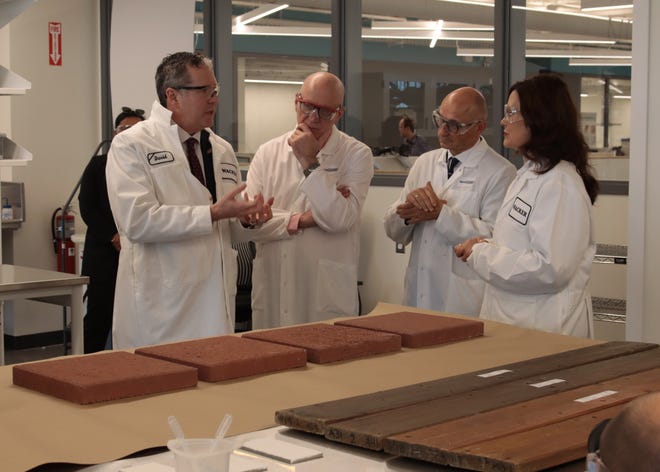

PITTSFIELD TWP. — Wacker Chemical Corp. celebrated the opening of its new Innovation Center and regional headquarters just outside Ann Arbor on Tuesday with a ribbon-cutting and tours for guests, including Gov. Gretchen Whitmer.
Wacker, which has had its North American headquarters and a production facility on Sutton Road in Raisin Township for 53 years, announced in 2018 that it would be moving its headquarters to the Ann Arbor area. It moved its research and development work to Ann Arbor in 2017.
About 240 employees work at the new, $50 million facility, which is on 18 acres on South State Road, between Textile and Ellsworth roads.
The production facility on Sutton Road with its 325 employees will remain in operation, and Wacker has plans to invest in the site, Wacker Chemical president and CEO David Wilhoit said in an interview.
“The more great products we develop here, the more we can produce in Adrian,” Robert Gnann, president of silicones for Wacker’s parent company, Wacker Chemie AG, said in an interview after the ceremony.
Wacker Chemie is based in Munich, Germany.
Wacker decided to move its headquarters and R&D from Lenawee County after finding it had difficulty recruiting top scientists, who often come from other countries, to the Adrian area.
More:Wacker Chemical Corp. announces site for new headquarters near Ann Arbor
More:200 Wacker employees to relocate out of Lenawee County
“We certainly would have loved to have had it in Lenawee County, but we certainly understand that people they’re hiring, chemists from all over the world coming in here, so they needed a place with Ann Arbor and all of the accompaniments that go with it,” said Lenawee Now executive director Jim Van Doren, who attended the ceremony. “It’s a beautiful building, they’ve done a great job, and they’re still a good corporate partner for Lenawee County. We’ve still got the plant. They’ve ensured us they’re going to invest in the plant for the next 10 years. … We worked together with our partners at Ann Arbor Spark to make sure that we kept all of these high-paying jobs in the state of Michigan, which we were able to do, working together with them and (the Michigan Economic Development Corp.). It’s a win-win for the state of Michigan, it’s a win-win for Lenawee, and it’s a win-win for Washtenaw County.”
A particular challenge in recruiting the kinds of R&D employees Wacker wants to Lenawee County is a lack of public transportation, Van Doren said.
“A lot of these people that they hire don’t have cars, and so they have to have a location where they have mass transit” he said. “Ann Arbor offers the things that we don’t offer.”

A news release from the governor’s office said Wacker chose Ann Arbor over sites in Ohio and Tennessee, where it has other plants.
“The production facility in Adrian will keep going strong as it has since 1969,” Whitmer said in her remarks. “But this facility, this Innovation Center, will be the new North American headquarters for a diverse and broad workforce and create additional, good-paying jobs for Michiganders.”
“It’s all about people,” Gnann said in his prepared remarks. “To have the leading role in the industry it’s absolutely vital to get the best talents on board and also to keep them onboard. When I look around, I think we’ve found another big argument that we are succeeding with that.”
The new facility gives Wacker the space it needs and room to grow, Wilhoit said in his prepared remarks to employees and guests in the building’s “collaboration spine,” an area of tiered, collaborative work spaces between the first and second floors. The site brings its R&D and administrative staffs for its North and Central Americas region together at one site rather than being at three locations in Michigan.

Along with labs, the facility includes a full-service cafeteria and a 24/7 fitness center. The entrance includes a portrait of company founder Alexander Wacker.
“Dr. Wacker started this company over 100 years ago with a plan to utilize innovation and chemistry to make a better world for generations,” Wilhoit said. “Our purpose is the same today. Our innovations span numerous market segments and positively impact all of our lives, ranging from construction materials, semiconductors, renewable energy, personal and health care, food applications, and pharmaceuticals.”
Some of the materials used to build the Innovation Center include Wacker products, Whitmer said.
The employees have been working at the site for about a month, Wilhoit said.
“Innovation almost sounds like a buzzword,” Gnann said in his remarks, “but it keeps companies relevant in very competitive markets. … I believe it is crucial for survival of mankind. That sounds quite prophetic, but pretty soon we will have to feed 10 billion people on this planet. And we all know that feeding is not enough. We all want to increase our well-being and all our living standards, and we all have to do that without exploiting and harming our environment.”
Wacker’s employees’ innovation will do that, he said, and its products can contribute to the transition to more sustainable industry.
“Wacker silicone is vital for the transition to e-mobility, wind energy, solar energy, digitization and many other applications,” he said.
“Most Michiganders and most people don’t appreciate how incredible the work is that happens here and how it improves the quality of all of our lives,” Whitmer said. “From Febreeze to an egg replacement for baking recipes to clear Gorilla glue — your work makes our lives better in so many ways big and small.”
Wacker materials went into the antiviral medication remdesivir and ventilator parts that have helped save lives during the pandemic, Whitmer said.
Wacker and Michigan-based Hemlock Semiconductor Corp. produce 80% of the world’s semiconductor-grade polysilicon that make “sci-fi technologies of the future possible today,” she said.